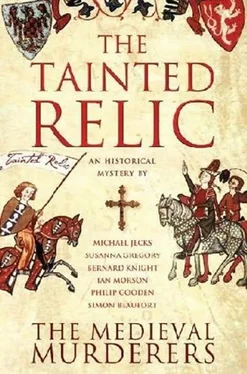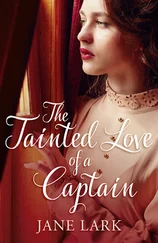Like the browsers we were, we idly cast our eyes over Master Hatch’s wares on the table-top. I glanced into the interior of the tent. The sunlight made it difficult to see much of the inside. In any case, there was a curtain slung near the entrance which shielded the interior. The curtain quivered and I had the feeling that we were being observed, probably through some small slit or spyhole. Confirmation that the tent was occupied came from indistinct sounds of talking within.
‘This seller seems to specialize in cony-catching and thief detection,’ said Abel Glaze, picking up a handful of the pamphlets. They were headed by titles such as A Manifest Detection of Dice-play or A Notable Discovery of Cozenage , this latter adorned with a picture of a rabbit or cony holding up a playing card in each paw.
‘Not altogether,’ said Jack Wilson, pointing to a pile whose topmost title read The Quickest Way to Heaven . ‘This should be more up Nick’s street, eh?’
Jack was in the habit of pretending that, since I was a parson’s son, I must have devout tastes. I ignored him and picked up a volume I recognized. It was by a playwright I’d once known, a man called Richard Milford, and this was a piece of his entitled The World’s Diseas’d , a play that was performed and published posthumously, as it happened. I knew it well, for I had played the character of Vindice the revenger. Now this book, which couldn’t have been more than three or four years old, looked forlorn and dusty in the summer sun. I already owned a copy but, if I hadn’t, I might have bought it for the sake of Milford’s memory. I hefted the book in my hand. Who else would remember him in a few years’ time? Before I could start on a melancholy train of thought about memory and reputation (the thing that William Shakespeare was so concerned with), my attention was caught by a definite stirring behind the curtain in the tent’s interior.
A man came out from the shadows. If anyone, I expected it to be Ulysses Hatch, proprietor, publisher and bookseller. I’d never seen him before and knew nothing about him, except that he’d once had a falling-out with WS and that he was fat. But the individual who came into the space by the mouth of the tent was small and slight. Furthermore I did recognize him. So did Abel and Jack, for it was the nip or cutpurse who’d been standing near Ben Nightingale the ballad singer. Peter Perkin was still wearing his rustic hat with the tickling straws. With the merest glance at us and the tiniest inclination of his head, he edged round the trestle table and walked off into the crowd.
I was surprised to encounter him. What was he doing inside a bookseller’s tent? The last we’d seen of this gent, only a few minutes earlier, he’d been in pursuit of a couple of the more prosperous-looking members of Nightingale’s audience. True, he might have carried out a fistful of thefts in that time (nips can be as quick as lightning), but surely his place was at the ballad singer’s heels, prospecting for new victims? Abel and Jack and I looked at each other, queries on our faces. I put down the volume I was holding.
‘Can I help you, gentlemen?’
Distracted by the appearance of the cutpurse, we hadn’t noticed another man emerging from the tent. He stood behind the table. Or rather he leaned against it, his belly flopping on to the surface as though it was a further object for sale. Ulysses Hatch was one of the fattest men I’d ever seen. Just as the pig’s head on a stake had reminded me of the traitors’ heads on London Bridge, so now Hatch’s visage reminded me of the pig’s. His cheeks bulged, his chin drooped and his eyes were small and reddened. There was a fringe of white hair round his head like a garland of dirty snow. He breathed heavily and there was sweat on his brow as though he’d been running to get to his present position behind the trestle table.
‘Only looking,’ said Jack.
‘I’ve got something stronger back there,’ said the pig-faced seller, peering at the three of us and indicating the inside of the tent with a plump hand. ‘Spicier wares. The Widow’s Solace , you know the ballad? Or Venus Pleasure ? It tells you what Mars did with Venus. There are pictures with that one. I publish them myself so quality is guaranteed.’
We all shrugged or grimaced as if to say ‘no thanks’, but I suspect that if any of us had been by himself he might have permitted the bookseller to show off some of his spicier wares. From the sounds of conversation emanating from the tent, there were others already in there.
‘Shut your gob!’
I started. The voice came from the tent. Ulysses Hatch smiled and jerked his head.
‘Hark at him,’ he said, then, seeing my expression, added ‘Don’t worry, sir. That wasn’t directed at you.’
As if to prove his words, a woman’s voice said something in altercation only to be answered with another ‘Shut your gob!’ in the same tone as before.
Jack was perusing a pamphlet called Kemp’s Nine Days’ Wonder . On the front was a picture of a dancing man in motley, with a drummer in the background. Like The World’s Diseas’d , this item I was also familiar with, since Will Kemp had been a clown in the Chamberlain’s Men, though before my time. Kemp’s career had dwindled after he’d quit the company, and his most notable feat had been to jig all the way from London to Norwich in nine days. Afterwards he wrote an account of his journey.
‘Ah, Will Kemp,’ said Ulysses Hatch. ‘Those were the glory days. He was a man of rare parts.’
Now, I’m pretty sure that Jack Wilson had known Kemp personally, since he’d been playing onstage longer than either of us. And indeed, both Abel Glaze and I had met the clown once when he was retired, and sick and listless in lodgings in Dow-gate. Nevertheless, our faces gave nothing away. For some reason, we were all on our guard.
‘They were fools to replace Kemp with Bob Armin,’ said Hatch.
Robert Armin was the current clown of the company and they were the King’s Men-us, or the shareholders to be precise. I had the sense that this fat man was probing us, testing us. Certainly he was familiar with the big names of the playing companies. None of us responded to his comment about the clowns.
‘Now our stage grows refined,’ continued the bookseller. ‘Audiences want a roof over their heads and carriages to convey them to the playhouse. They want polite clowns. They want cushions under their bums.’
‘You’re in the right there,’ said Abel.
‘You gentlemen are connected to the theatre, then?’ said Hatch, shifting his piggy head from side to side.
‘In a manner of speaking,’ I said.
‘And what manner might that be?’
I shrugged. This wasn’t going how I’d planned it. Or rather I hadn’t planned anything, relying instead on the ‘discretion’ and ‘good sense’ that WS had credited me with. He’d also called me ‘straightforward’, so now I decided that an honest approach might be best. Nevertheless, I paused before I spoke and glanced around. The business and pleasure of Bartholomew Fair trickled past us, rather sluggish in this backwater. No one was paying attention to three men standing at the door of a bookseller’s tent. If anyone had noticed us, they’d most likely assume we were in search of Hatch’s spicy wares.
‘You have found us out, sir,’ I said. ‘We are to do with the playhouse.’
‘Which playhouse?’
‘Any one that will have us,’ I said.
‘Not Shakespeare’s.’
I shook my head almost imperceptibly, no spoken lie. The others said nothing.
‘As long as you’re not from Shakeshaft’s lot,’ said Hatch. ‘But I thought you were players. I can smell you over a distance.’
Читать дальше












